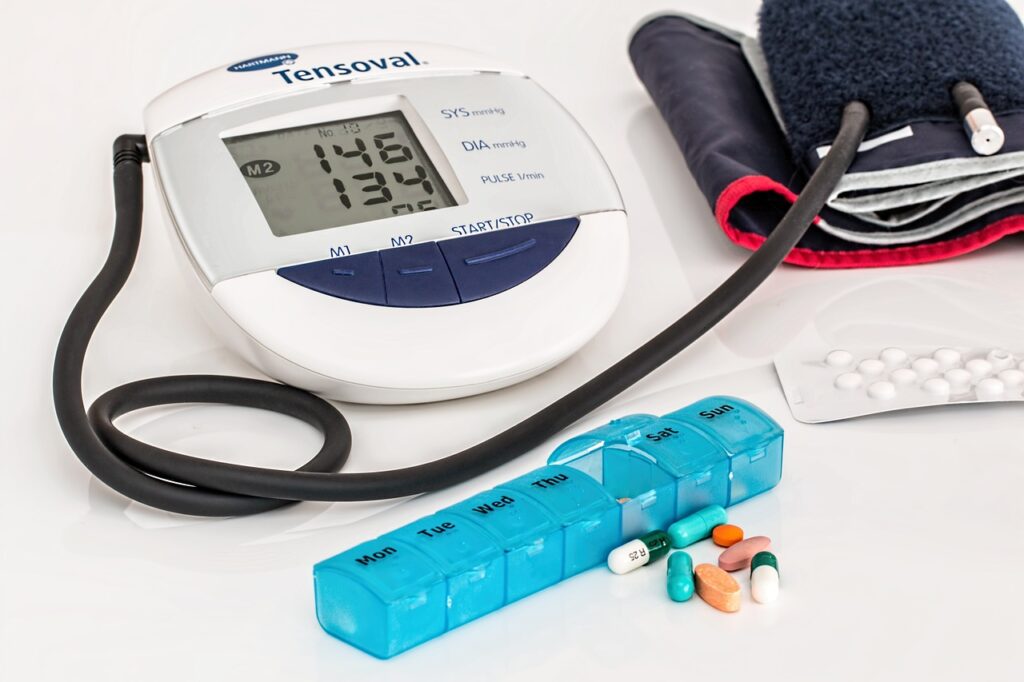Heart-Healthy Habits for Hypertension management in Aging Adults
Contents
- 1 Heart-Healthy Habits for Hypertension management in Aging Adults
- 1.1 Introduction
- 1.1.1 Understanding Hypertension in Aging Adults
- 1.1.2 Key Heart-Healthy Habits for Hypertension Management
- 1.1.3 Maintain a Healthy Weight
- 1.1.4 Adopt a Nutrient-Rich Diet
- 1.1.5 Engage in Regular Physical Activity
- 1.1.6 Mind Your Sodium Intake
- 1.1.7 Quit Smoking for Heart Health
- 1.1.8 Effective Stress Management
- 1.1.9 Regular Monitoring and Checkups
- 1.1.10 Medication Adherence
- 1.1.11 Educate Yourself on Hypertension
- 1.2 FAQs on Heart-Healthy Habits for Hypertension Management in Aging Adults
- 1.1 Introduction
Read DISCLAIMER
Discover practical heart-healthy habits for effectively hypertension management in aging adults. Learn how to safeguard your heart and improve overall well-being.
Introduction
High blood pressure, often known as hypertension, is a widespread ailment that affects a sizeable number of the world’s population. Aging adults are particularly susceptible to this health concern. Managing hypertension is paramount, as it can lead to severe complications such as heart disease, stroke, kidney issues, and more. In this comprehensive guide, we’ll explore effective heart-healthy habits that aging adults can adopt to manage hypertension and maintain optimal heart health.

Understanding Hypertension in Aging Adults
Hypertension is characterized by persistently elevated blood pressure, which can strain the cardiovascular system and increase the risk of serious health conditions. Aging adults are particularly susceptible to hypertension due to factors such as decreased elasticity in blood vessels and the cumulative effects of lifestyle choices.
Key Heart-Healthy Habits for Hypertension Management
Aging adults can take proactive steps to manage hypertension and promote heart health. By embracing a range of heart-healthy habits, they can effectively control blood pressure and enhance their overall quality of life.
Maintain a Healthy Weight
Maintaining an optimal weight is crucial for hypertension management. Excess weight can contribute to elevated blood pressure. A balanced diet and regular exercise are essential for achieving and maintaining a healthy weight.
Adopt a Nutrient-Rich Diet
A heart-healthy diet rich in fruits, vegetables, whole grains, lean proteins, and healthy fats can significantly impact blood pressure. Reducing sodium intake is particularly important, as excess salt consumption can lead to elevated blood pressure.
Engage in Regular Physical Activity
Physical activity plays a pivotal role in heart health. Regular exercise helps lower blood pressure and improves overall cardiovascular function. Aim for at least 150 minutes of moderate-intensity exercise per week.
Mind Your Sodium Intake
Excessive sodium intake can contribute to hypertension. Limiting daily salt consumption to less than 2,300 milligrams is recommended.
Quit Smoking for Heart Health
Smoking is a major risk factor for hypertension and heart disease. Quitting smoking leads to immediate improvements in blood pressure and overall cardiovascular well-being.
Effective Stress Management
Chronic stress can elevate blood pressure levels. Incorporating stress-reduction techniques such as meditation, deep breathing, and engaging in hobbies can promote heart health.
Regular Monitoring and Checkups
Regular blood pressure monitoring and medical checkups are essential. Collaboration with healthcare providers ensures that treatment plans are effective and adjustments can be made as needed.
Medication Adherence
Taking prescribed medications consistently is crucial for blood pressure control. Seniors should follow their healthcare provider’s recommendations and communicate any concerns.
Educate Yourself on Hypertension
Understanding hypertension and its potential complications empowers aging adults to make informed decisions. Educational resources and discussions with healthcare providers are valuable in this regard.
FAQs on Heart-Healthy Habits for Hypertension Management in Aging Adults
Q1: What is hypertension, and why are aging adults more susceptible to it?*
A1: Hypertension, or high blood pressure, is a condition characterized by persistently elevated blood pressure levels. Aging adults are more susceptible due to factors such as decreased elasticity in blood vessels and cumulative lifestyle effects, like diet and physical activity.
Q2: How does excess weight affect hypertension in aging adults?
A2: Excess weight can contribute to elevated blood pressure. Maintaining a healthy weight through a balanced diet and regular exercise is crucial for hypertension management in aging adults.
Q3: What should a heart-healthy diet for hypertension management include?
A3: A heart-healthy diet should be rich in fruits, vegetables, whole grains, lean proteins, and healthy fats. It’s essential to reduce sodium intake, as excess salt consumption can lead to elevated blood pressure.
Q4: How much physical activity is recommended for aging adults with hypertension?
A4: Aim for at least 150 minutes of moderate-intensity exercise per week. Regular physical activity helps lower blood pressure and improve overall cardiovascular function.
Q5: Why is smoking cessation important for heart health in aging adults?
A5: Smoking is a major risk factor for hypertension and heart disease. Quitting smoking leads to immediate improvements in blood pressure and overall cardiovascular well-being.
Q6: How can stress management benefit hypertension control in aging adults?
A6: Chronic stress can elevate blood pressure levels. Techniques like meditation, deep breathing, and engaging in hobbies can promote heart health by reducing stress.
Q7: Why is regular monitoring and checkups crucial for aging adults with hypertension?
A7: Regular blood pressure monitoring and medical checkups are essential to ensure treatment plans are effective and can be adjusted as needed to manage hypertension effectively.
Q8: What role does medication adherence play in hypertension management for aging adults?
A8: Taking prescribed medications consistently is crucial for blood pressure control. Aging adults should follow their healthcare provider’s recommendations and communicate any concerns.
Q9: How can aging adults educate themselves about hypertension and its complications?
A9: Understanding hypertension and its potential complications empowers individuals to make informed decisions. Seek educational resources and engage in discussions with healthcare providers for valuable insights.
Q10: Why is a personalized approach to hypertension management important?
A10: Each person’s journey with hypertension is unique. Treatment plans should be tailored to individual needs and circumstances
Conclusion
Effective management of hypertension is pivotal for aging adults to mitigate the risk of heart-related complications. By adopting heart-healthy habits, such as maintaining a balanced diet, engaging in regular exercise, and managing stress, individuals can take control of their cardiovascular well-being. Remember, every positive lifestyle change you make contributes to a healthier heart and a better quality of life.

Can you be more specific about the content of your article? After reading it, I still have some doubts. Hope you can help me.
Thank you, your article surprised me, there is such an excellent point of view. Thank you for sharing, I learned a lot.
Can you be more specific about the content of your article? After reading it, I still have some doubts. Hope you can help me.
Your point of view caught my eye and was very interesting. Thanks. I have a question for you. https://www.binance.com/en/register?ref=JHQQKNKN
Your article helped me a lot, is there any more related content? Thanks! https://accounts.binance.com/en/register?ref=JHQQKNKN
Your article helped me a lot, is there any more related content? Thanks!